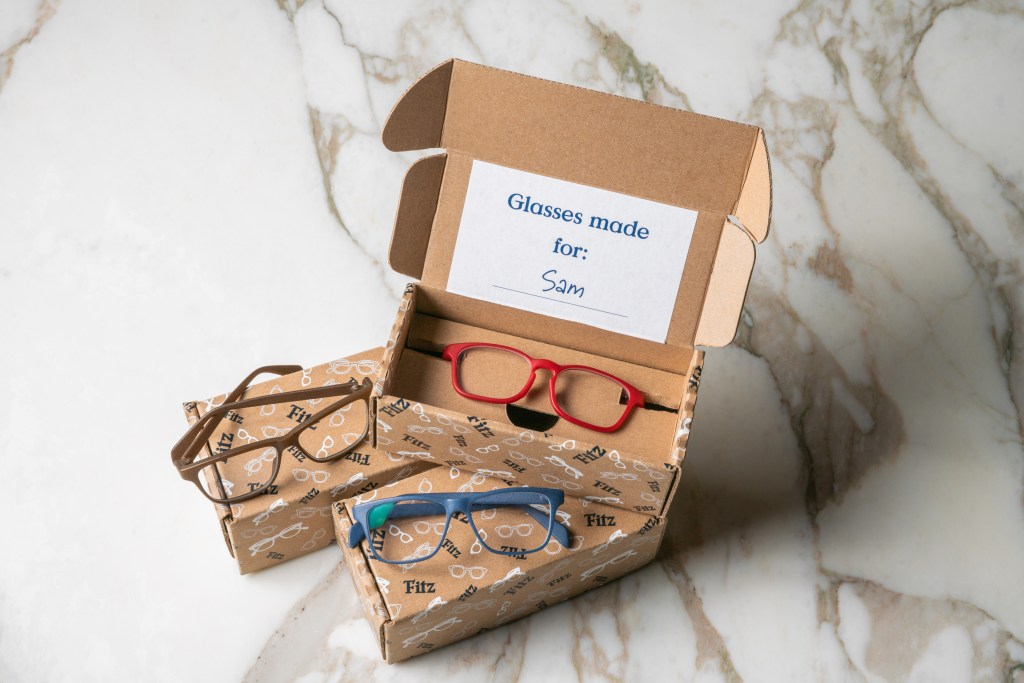With screen time (majorly) on the rise, we liked the idea of exploring how to better protect our eyes. After doing a bit of research, we spoke with Dr. Oscar Lillo, OD — a registered optometrist with Pacific Medical Centers (PacMed) at the Renton and Totem Lake clinics — to get some helpful tips.
We learned from Fitz Frames that Americans spend more than 10 hours a day on screens – which we all know can lead to eye damage, fatigue and sleep disruption. Fitz Frames offers blue light filtering glasses (in a variety of fun styles and hues), and they are revolutionizing the eyeglass experience by delivering custom-fitted, 3D-printed glasses for both kids and adults.

The Fitz Frames app offers a 100% mobile shopping experience that uses the iPhone TrueDepth camera with advanced facial mapping to measure more than 1,000 points on your face for a custom fit. The app also offers users a virtual try-on experience through augmented reality.
(In order to take advantage of the custom fitting feature, users must have an iPhone X, Xs, Xr, 11, or iPad Pro or newer, but all devices can browse and use the 2D try-on feature.)

Here’s what we learned during our chat with Dr. Lillo:
Seattleite: What are the most important tips people need to keep in mind as our time in front of screens increases?
- It’s healthy to relax your eyes by glancing at distance for 20 seconds every 20 minutes of computer viewing time, this relaxes the eye focusing mechanism and relieves eye strain.
- While using the computer for long periods, rest the eyes for 15 minutes after two hours of continuous computer use.
- To help with eye dryness while working at the computer, keep the natural blinking of your eyelids.
- Place the desktop computers at about 20 to 30 inches away from you and adjust the top of the screen just below horizontal eye level. Tilt the top of the screen away from you at an angle of 10 to 20-degrees.
- It’s important to make sure that your glasses prescriptions are up to date for that specific working distance. Uncorrected or under corrected vision problems can contributing to computer-related eyestrain.
- Patients may benefit from specific computer prescription glasses for computer work.

Seattleite: Are there settings on our laptops and devices that will improve the situation?
- Adjust the contrast of the letters to the background to an optimal level were it not overwhelming.
- If needed, use a screen glare filter to decrease the amount of light glare reflected off the screen.
- Keep your screens clean to improve clarity.
Seattleite: What are your thoughts on blue light filtering glasses?
- Blue light affects the body’s natural wake and sleep cycle. During the day, blue light wakes us up but too much blue light exposure late at night from your phone, tablet or computer can make it difficult to sleep.
- Sunlight is the largest source of Blue Light. Other sources include fluorescent light, compact fluorescent light bulbs and LED lights.
- Blue light from computer phones or computer devices is much less than from the sun, and presently there is no conclusive evidence on the harmful effects to exposure from these devices.
Seattleite: Can you talk a bit about optimal lighting to have in our home (especially while using our screens at nighttime)?
- Keep the room lights on at a level that does not cause glare problems.
- If glare reflections are present on the screen, reposition the computer screen to avoid glare from overhead lighting or windows, or if needed use a glare filter screen.
- One can also use window coverings if direct sunlight is on your screen, and if needed replace the light bulbs to lower wattage.

Seattleite: What do you recommend for dry eyes?
There are numerous over the counter artificial tears, or prescription eye drops, or other means, that can be recommended for specific eye conditions to help with dry eyes. At your eye examination, this can be evaluated and recommended.
Seattleite: How can we tweak our diet to protect our eye health?
- Dietary lutein, zeaxanthin, omega-3 fatty acids, vitamins, A, C, and E and mineral zinc help to improve the pigment density of the macula to protect the cells in the macular.
- Lutein and zeaxanthin are found in broccoli, brussels sprouts, collard greens, eggs, kale, nectarines, oranges, papayas, romaine lettuce, spinach, squash
- Omega-3 fatty acids are found in flaxseed, flaxseed oil, halibut, salmon, sardines, tuna, walnuts
- Vitamin A in apricots, cantaloupe, carrots, mangos, red peppers, ricotta cheese, spinach, sweet potatoes.
- Vitamin C in broccoli, brussels sprouts, grapefruit, kiwi, oranges, red peppers, strawberries
- Vitamin E in Almonds, broccoli, peanut butter, spinach, sunflower seeds
- Zinc in chickpeas, oysters, pork chops, red meat, yogurt
Seattleite: Anything else we should know?
A simple way to keep our eyes healthy is to remember to wear proper protective eyewear when the situation is called for.
Dr. Oscar Lillo, OD, is a registered optometrist with Pacific Medical Centers (PacMed) at the Renton and Totem Lake clinics. He got his training from Illinois College of Optometry and Glaucoma Consultants, NW. He is particularly interested in clinical optometry, including contact lenses, ocular diseases and refractive evaluations and speaks English and Spanish.
